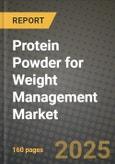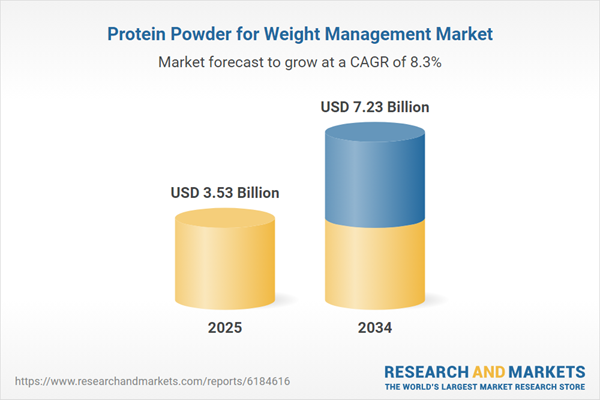Protein Powder for Weight Management Market
Protein powders for weight management have evolved from niche sports supplements into mainstream functional nutrition, positioned for satiety, muscle preservation during calorie restriction, metabolic health, and convenient meal structuring. The category spans animal-based proteins (whey concentrate/isolate, casein, collagen blends) and plant-based options (pea, rice, soy, faba, hemp, and multi-source blends), delivered as ready-to-mix powders, single-serve sachets, stick packs, and advanced formats like clear/refreshing proteins. Top applications/end-uses include meal replacements, pre/post-workout shakes, breakfast smoothies, appetite-control snacks, clinical/medical weight protocols, and corporate wellness or digital coaching bundles. Trends emphasize clean labels, sugar control, low-allergen and lactose-free SKUs, digestive comfort (low FODMAP, enzyme-assisted), and hybrid value propositions that combine protein with fibers, MCTs, minerals, and microbiome-supporting components. Drivers include rising overweight prevalence, preventive health behaviors, the shift to at-home fitness, retail and e-commerce expansion, and growing clinician and dietitian engagement. The competitive landscape features global sports nutrition brands, functional food companies, private label retailers, and digital-first challengers that pair products with apps, habit coaching, and subscription experiences. Differentiation is moving from grams-per-serving to verifiable outcomes - satiety, lean mass retention, energy, and compliance - supported by ingredient transparency, taste leadership, and mixability across water, milk, and plant milks. Manufacturing focus areas include flavor systems that mask plant off-notes, instantization for cold solubility, heat-stable proteins for baking, and rigorous contaminant, allergen, and heavy metal controls. Overall, the market is professionalizing around evidence-aware claims, data-enabled personalization, and omni-channel delivery that fits busy routines without compromising nutrition quality.Protein Powder for Weight Management Market Key Insights
- From “more protein” to “better protocol.” Leading brands bundle protein with fibers, electrolytes, and micronutrients, plus guidance on timing and portioning. Programs emphasize morning anchoring, post-exercise recovery, and evening satiety, translating into higher adherence and repeat purchase compared with standalone tubs.
- Plant-based moves from compromise to parity. Multi-source blends balance amino acid profiles and PDCAAS outcomes while minimizing earthy or beany notes. Enzyme-treated and micro-milled proteins improve digestibility and mouthfeel, enabling neutral-tasting shakes that perform in water without heavy sweeteners.
- Sensory is a decisive moat. Taste, aroma, and texture determine stickiness in weight programs. Advances in flavor modulators, sweetener systems, and fat-mimicking hydrocolloids deliver creamy body at lower calories. Clear/refreshing proteins open non-milky occasions, broadening dayparts and seasonal appeal.
- Satiety architecture gets smarter. Slow/fast protein combinations, viscous fibers, and fat-emulsion strategies prolong fullness. Labels increasingly articulate “how to use” (pre-meal, snack replacement, evening curb) rather than generic promises, aligning expectations with real-world routines.
- Personalization and data loop. Quiz-driven profiling and app telemetry tailor serving size, flavor rotations, and reorder cadence. Programs track energy, hunger, and adherence, turning qualitative feedback into recipe tweaks and cohort-specific bundles that reduce churn.
- Clean label and intolerance management. Lactose-free, gluten-free, soy-free, and low-FODMAP options expand reach. Heavy-metal, pesticide, and allergen testing is table stakes, with batch-level certificates and QR traceability building trust for daily use.
- Active aging and clinical adjacency. Formulations target muscle maintenance during weight loss, with collagen or casein adjuncts and bone-health cofactors. Medical and wellness channels favor neutral flavors, low osmolality, and simplified excipient lists compatible with supervised programs.
- Convenience and format innovation. Single-serve sticks, shaker-ready granulation, and no-blender textures support on-the-go routines. Bake-stable proteins and smoothie booster pods extend usage into snacks and meals, increasing frequency beyond classic shake occasions.
- Retail media and community flywheel. Influencer cohorts and retail media networks convert discovery into trial. Subscription models with flavor drops, limited editions, and milestone rewards reinforce community identity and program completion.
- ESG and sourcing discipline. Verified supply chains, responsible agriculture, and recyclable or mono-material packaging influence retailer listings. Brands that publish clear sustainability progress and reduce packaging mass gain competitive advantage in premium shelves.
Protein Powder for Weight Management Market Reginal Analysis
North America
A mature ecosystem with strong sports-to-wellness crossover. Consumers prioritize taste, clean labels, and digestive comfort, with rapid adoption of plant blends and lactose-free whey isolates. Omni-channel distribution - specialty retail, club, grocery, and D2C - supports trial and subscription. Corporate wellness and telehealth weight programs integrate protein as a compliance tool, while stringent testing norms shape supplier selection.Europe
Emphasis on ingredient provenance, sugar control, and sustainability. Private label gains share alongside premium brands that offer balanced meal replacements and plant-forward options. Regulatory discipline favors conservative claim language and clear usage guidance. Convenience formats - sachets, RTM sachets, and clear proteins - grow in pharmacy and grocery, with recycling-ready packaging increasingly mandated by retailers.Asia-Pacific
High mobile penetration and live-commerce accelerate education and trial. Japan and Korea value subtle flavors and low-sweetness profiles; Australia and New Zealand expand active-lifestyle RTDs; India and Southeast Asia scale affordability tiers and vegetarian/plant-first solutions. Heat-stable and water-clear formats suit tropical climates, while localized flavors drive repeat purchase.Middle East & Africa
GCC markets favor premium lifestyle and weight-management bundles tied to gyms and wellness clinics. Halal, clean-label, and low-sugar positioning resonate, with single-serve sticks supporting travel and on-the-go usage. Broader Africa adopts value-focused tubs and sachets through modern trade and e-commerce, with education on safe use and hydration emphasized.South & Central America
Growth aligns to gym culture, soccer-driven fitness, and influencer-led wellness. Price sensitivity boosts private label and economy SKUs, while premium niches adopt low-carb, low-sugar, and plant blends. Distributors prioritize heat-stable flavors and robust instantization for hot climates. Retailers support discovery via sample packs and cross-merchandising with shaker accessories.Protein Powder for Weight Management Market Segmentation
By Type
- Soy Protein Isolate
- Whey Protein Isolate
- Others
By Application
- Specialty Store
- Retail Pharmacy
- Online Sales
- Others
Key Market players
Glanbia Plc, Abbott Laboratories, Nestlé S.A., Herbalife Nutrition Ltd., Amway Corporation, BellRing Brands, Inc., GNC Holdings, Inc., NOW Foods, Quest Nutrition LLC, Danone S.A., The Bountiful Company, Iovate Health Sciences International Inc., Vitaco Health Group, AMCO Proteins, MusclePharm Corporation.Protein Powder for Weight Management Market Analytics
The report employs rigorous tools, including Porter’s Five Forces, value chain mapping, and scenario-based modelling, to assess supply-demand dynamics. Cross-sector influences from parent, derived, and substitute markets are evaluated to identify risks and opportunities. Trade and pricing analytics provide an up-to-date view of international flows, including leading exporters, importers, and regional price trends.Macroeconomic indicators, policy frameworks such as carbon pricing and energy security strategies, and evolving consumer behaviour are considered in forecasting scenarios. Recent deal flows, partnerships, and technology innovations are incorporated to assess their impact on future market performance.
Protein Powder for Weight Management Market Competitive Intelligence
The competitive landscape is mapped through proprietary frameworks, profiling leading companies with details on business models, product portfolios, financial performance, and strategic initiatives. Key developments such as mergers & acquisitions, technology collaborations, investment inflows, and regional expansions are analyzed for their competitive impact. The report also identifies emerging players and innovative startups contributing to market disruption.Regional insights highlight the most promising investment destinations, regulatory landscapes, and evolving partnerships across energy and industrial corridors.
Countries Covered
- North America - Protein Powder for Weight Management market data and outlook to 2034
- United States
- Canada
- Mexico
- Europe - Protein Powder for Weight Management market data and outlook to 2034
- Germany
- United Kingdom
- France
- Italy
- Spain
- BeNeLux
- Russia
- Sweden
- Asia-Pacific - Protein Powder for Weight Management market data and outlook to 2034
- China
- Japan
- India
- South Korea
- Australia
- Indonesia
- Malaysia
- Vietnam
- Middle East and Africa - Protein Powder for Weight Management market data and outlook to 2034
- Saudi Arabia
- South Africa
- Iran
- UAE
- Egypt
- South and Central America - Protein Powder for Weight Management market data and outlook to 2034
- Brazil
- Argentina
- Chile
- Peru
Research Methodology
This study combines primary inputs from industry experts across the Protein Powder for Weight Management value chain with secondary data from associations, government publications, trade databases, and company disclosures. Proprietary modeling techniques, including data triangulation, statistical correlation, and scenario planning, are applied to deliver reliable market sizing and forecasting.Key Questions Addressed
- What is the current and forecast market size of the Protein Powder for Weight Management industry at global, regional, and country levels?
- Which types, applications, and technologies present the highest growth potential?
- How are supply chains adapting to geopolitical and economic shocks?
- What role do policy frameworks, trade flows, and sustainability targets play in shaping demand?
- Who are the leading players, and how are their strategies evolving in the face of global uncertainty?
- Which regional “hotspots” and customer segments will outpace the market, and what go-to-market and partnership models best support entry and expansion?
- Where are the most investable opportunities - across technology roadmaps, sustainability-linked innovation, and M&A - and what is the best segment to invest over the next 3-5 years?
Your Key Takeaways from the Protein Powder for Weight Management Market Report
- Global Protein Powder for Weight Management market size and growth projections (CAGR), 2024-2034
- Impact of Russia-Ukraine, Israel-Palestine, and Hamas conflicts on Protein Powder for Weight Management trade, costs, and supply chains
- Protein Powder for Weight Management market size, share, and outlook across 5 regions and 27 countries, 2023-2034
- Protein Powder for Weight Management market size, CAGR, and market share of key products, applications, and end-user verticals, 2023-2034
- Short- and long-term Protein Powder for Weight Management market trends, drivers, restraints, and opportunities
- Porter’s Five Forces analysis, technological developments, and Protein Powder for Weight Management supply chain analysis
- Protein Powder for Weight Management trade analysis, Protein Powder for Weight Management market price analysis, and Protein Powder for Weight Management supply/demand dynamics
- Profiles of 5 leading companies - overview, key strategies, financials, and products
- Latest Protein Powder for Weight Management market news and developments
Additional Support
With the purchase of this report, you will receive:- An updated PDF report and an MS Excel data workbook containing all market tables and figures for easy analysis.
- 7-day post-sale analyst support for clarifications and in-scope supplementary data, ensuring the deliverable aligns precisely with your requirements.
- Complimentary report update to incorporate the latest available data and the impact of recent market developments.
This product will be delivered within 1-3 business days.
Table of Contents
Companies Mentioned
- Glanbia PLC
- Abbott Laboratories
- Nestlé S.A.
- Herbalife Nutrition Ltd.
- Amway Corporation
- BellRing Brands Inc.
- GNC Holdings Inc.
- NOW Foods
- Quest Nutrition LLC
- Danone S.A.
- The Bountiful Company
- Iovate Health Sciences International Inc.
- Vitaco Health Group
- AMCO Proteins
- MusclePharm Corporation.
Table Information
| Report Attribute | Details |
|---|---|
| No. of Pages | 160 |
| Published | November 2025 |
| Forecast Period | 2025 - 2034 |
| Estimated Market Value ( USD | $ 3.53 Billion |
| Forecasted Market Value ( USD | $ 7.23 Billion |
| Compound Annual Growth Rate | 8.3% |
| Regions Covered | Global |
| No. of Companies Mentioned | 15 |









